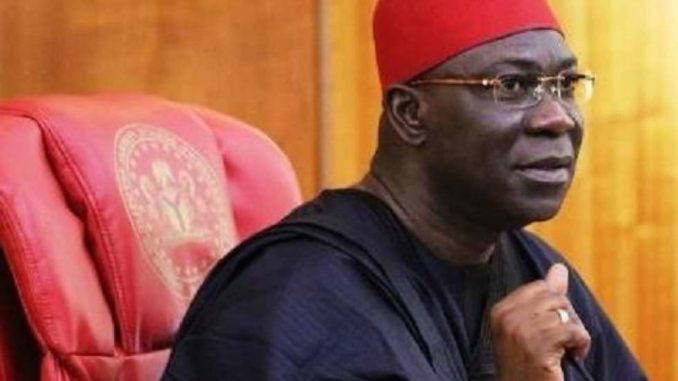
Celebrating a ‘lawmakers’ lawmaker’
I, Senator Ike Lawrence Ekweremadu, do solemnly swear that I will be faithful and bear true allegiance to the Federal Republic of Nigeria…” the voice of the Senator representing Enugu West Senatorial District reverberated in the hallowed chamber of the Senate on June 6, 2007. The lawmaker, who was first elected into the Senate in 2003, was being led in Oath of Office by the former Clerk to the National Assembly (CNA), Alhaji Ibrahim Arab, after his emergence as the Deputy President of the Fifth Senate.
His election was preceded by the battle of two brothers, Senator Akume (PDP, Benue North West) and Senator David Mark (PDP, Benue South), for the position of the Senate President, which Mark won with 68 votes as against Akume’s 39 in an election defined by a vortex of intrigues, drama, and extreme anxiety. A senator abstained, while Senator Chimaroke Nnamani was absent.
Meanwhile, although Ekweremadu was already endorsed ahead of the inauguration to emerge unopposed, I am sure he knew it was never really over until it was over.
Thus began Ekweremadu’s fairytale journey as a presiding officer- a journey hardly anyone, possibly even himself, expected to last this long. Not with the high turnover of presiding officers at the time. The Senate produced five Senate Presidents in eight years.
Unarguably, therefore, one of the legacies the Mark/Ekweremadu leadership bequeathed was a stable Senate. By 2011, the tempest-tossed Senate had calmed, such that both men re-emerged unopposed during the inauguration of the Seventh Senate.
However, it was a different ball game during the inauguration of the Eighth Senate on June 9, 2015. Not only did he face opposition for the coveted seat for the first time since 2007, he did so on the unfavorable platform of a minority party.
It was one election that compared in horse-trading and trepidations only to that of Sixth Senate. While Senator Bukola Saraki (Kwara Central) emerged unopposed to the surprise of many, Ekweremadu slugged it out with Senator Ali Ndume (APC, Borno South). He polled 54 votes as against Ndume’s 20 votes. With PDP commanding 49 seats at the time, 54 votes meant that Ekweremadu had a bipartisan appeal.
Instructively, the Senate has, to a very great extent, fused as one and is intensively preoccupied with moving the nation forward, although Saraki and Ekweremadu continue to bear the backlash, the baptism of fire and brimstone arising from their emergence. It is topic for another day. The good thing is that even those who thought a bipartisan parliamentary leadership would never work (even though they had supported and defended it in the recent past) cannot but appreciate the synergy and progress being made by the Eighth Senate.
Meanwhile, Ekweremadu has not lasted this long because there are no other equally highly competent hands to do the job, since the Red Chamber is populated by Nigerians who have made their marks in various fields of human endeavour.
Ekweremadu’s political staying power, I guess, rests on the confidence reposed in him by his constituents and colleagues. He has earned their trust and respect across party lines. Many of them have often commented on his trademark humility, brainpower, progressivism, and pan-Nigerian perspectives, approaches to issues as well as the experience and stability he brings to bear on the system.
At the institutional level, Mark/Ekweremadu leadership restored stability and greater accountability to the Senate. Many must have forgotten that in 2007, the Senate leadership, in an unprecedented move, returned about N7 billion unspent Senate allocation to the public treasury. I guess that was how returning unspent votes among the MDAs became a norm.
To remedy the proverbial banana peel, the leadership ensured that procurement was left entirely to the National Assembly (NASS) bureaucracy. The duo also moved the Senate from the era of super presiding officers to that of first among equals; an era where lawmakers collectively appropriate resources available to the Senate in line with the Appropriation Act.
Meanwhile, in line Senator Saraki’s inaugural promise on Open NASS, the Saraki/Ekweremadu leadership has moved transparency a notch higher by throwing the NASS budget open for public scrutiny.
Ekweremadu’s 10 years as a presiding officer will be particularly be remembered for the progress in the area of constitution amendment and electoral reforms. All previous initiatives failed, such that by the time Ekweremadu took over as the Chairman of the Constitution Review Committee in 2007, Nigerians did not give NASS a chance. But, with tenacity and patriotism, the jinx was broken in 2010, with the Sixth Senate amending the constitution three times.
As Nigerians reflect on Ekweremadu’s decade-long odyssey as a presiding officer, the longest in our history, many would agree that he deserves 10 garlands as a man who has continued to live up to his billings as a nation-builder, democrat, patriot, and, as Senator Zainab Kure once put it, “a lawmakers lawmaker”.
Uche Anichukwuis Special Adviser (Media) to Deputy President of the Senate.
